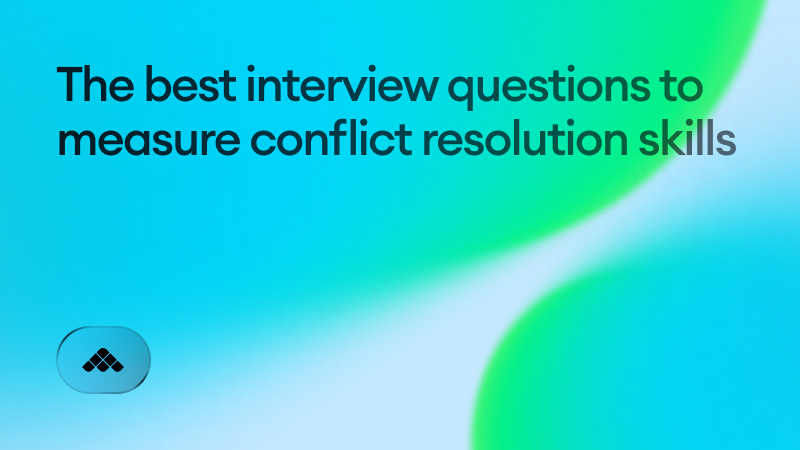Conflict is inevitable in any team setting, but how individuals handle disagreements can significantly impact team morale, productivity, and overall organizational success.
During the hiring process, assessing a candidate's conflict resolution skills can provide valuable insights into their interpersonal abilities and suitability for your company culture.
This article presents the best interview questions to evaluate conflict resolution competencies, guidance on interpreting responses, and tips to effectively assess these skills during interviews.
Key takeaways
- Conflict resolution skills are essential in fast-moving, collaborative environments, where disagreements happen often and impact delivery, morale, and outcomes.
- Strong conflict resolution abilities signal emotional intelligence, communication strength, and maturity, all of which predict better team performance and fewer interpersonal issues.
- The right interview questions help you dig beneath surface-level answers, uncovering how candidates behave under pressure, navigate difficult dynamics, and repair relationships after tension.
What are conflict resolution skills?
Conflict resolution skills are the abilities that help a person navigate disagreements, misalignment, or tension in a constructive and emotionally intelligent way.
These skills include active listening, empathy, emotional regulation, problem-solving, negotiation, and the capacity to see an issue from multiple perspectives. Someone with strong conflict resolution skills doesn’t avoid hard conversations—they handle them calmly, clearly, and with the goal of moving the team forward.
In practice, it’s about transforming friction into clarity, alignment, and progress.
Why is conflict resolution so valuable in candidates?
Because conflict isn’t rare—it’s guaranteed. Fast-growing teams face shifting priorities, tight deadlines, cross-functional dependencies, and competing opinions on the “right” way to do something.
Candidates who can’t handle tension productively create more work for everyone else: more escalations, more rework, and more interpersonal strain.
Great conflict resolvers, on the other hand, strengthen teams. They maintain momentum even when things get messy. They collaborate better, build trust quickly, and prevent small disagreements from becoming morale-killing issues.
These are the people who keep projects on track, reduce communication overhead, and elevate the quality of work across the group.
In almost every role—especially leadership, customer-facing, and cross-functional roles—conflict resolution is a clear predictor of long-term success.
Conflict resolution interview questions
Here's a pretty complete list of the best questions to test conflict resolution. We'll look at what to look for next and how to actually assess candidates next.
- Describe a time when you had a disagreement with a coworker. How did you handle it?
- How do you approach conflicts in a team setting?
- Tell me about a situation where you had to mediate between two team members. What was the outcome?
- How do you handle feedback that you disagree with?
- Describe a time when you had to adjust your communication style to resolve a conflict.
- What strategies do you use to stay calm and composed during a conflict?
- Can you give an example of a conflict that led to a positive change in your workplace?
- How do you ensure that conflicts do not escalate to affect your work performance?
- Describe a time when you identified a potential conflict before it became a problem. What actions did you take?
- How do you balance assertiveness and empathy when resolving conflicts?
What to look for in answers
- Specificity and detail: Candidates should provide concrete examples with clear context, actions taken, and outcomes achieved, demonstrating their practical experience in conflict resolution.
- Effective communication skills: Look for evidence of active listening, clear articulation, and the ability to communicate emotions and perspectives constructively.
- Problem-solving ability: Strong responses will highlight the candidate's capacity to analyze conflicts, identify root causes, and implement effective solutions.
- Emotional intelligence: Assess whether the candidate shows empathy, self-awareness, and the ability to manage their emotions and understand others' feelings during conflicts.
- Collaboration and teamwork: Responses should reflect a collaborative approach, emphasizing teamwork and the importance of maintaining positive working relationships.
- Adaptability and flexibility: Candidates should demonstrate the ability to adjust their strategies based on the situation and the people involved in the conflict.
- Outcome orientation: Look for a focus on achieving mutually beneficial outcomes and learning from the conflict to prevent future issues.
How to evaluate conflict resolution during the hiring process
Evaluating conflict resolution skills takes more than asking a single question—it requires a structured approach that reveals how candidates think, react, and collaborate under pressure.
The goal is to go beyond surface-level responses and uncover the patterns behind how they navigate tension and disagreements. Use the techniques below to get a clear, reliable picture of how candidates handle real-world conflict.
Use behavioral interview techniques
Behavioral questions help candidates ground their answers in real experiences rather than theory or generic statements. When people describe specific situations—who was involved, what went wrong, and what they did—you get a more accurate picture of their instincts under pressure.
These answers reveal not only what they did, but how they thought through the conflict. Behavioral questions also make it harder for candidates to hide behind polished, rehearsed responses.
Probe for depth
Strong conflict resolution isn’t just about the outcome—it’s about the mindset behind the decisions. Follow-up questions help you unpack why the candidate chose a particular approach, what trade-offs they considered, and how they evaluated success.
This is where you uncover emotional intelligence, accountability, and maturity. It also exposes whether someone handled the conflict thoughtfully or simply got lucky.
Assess cultural fit
Every organization handles conflict differently. Some value direct, fast escalation; others prioritize diplomacy, consensus-building, or psychological safety. Evaluate whether the candidate’s natural style aligns with the way your teams collaborate—because even strong conflict resolvers can struggle in environments that don’t match their instincts.
Good alignment ensures smoother relationships and fewer friction points once they join.
Evaluate consistency
Look for patterns across multiple stories or examples. If a candidate claims to be collaborative but their examples are full of defensiveness, blame, or avoidance, that inconsistency is a red flag. Consistency across different questions and scenarios suggests genuine self-awareness and well-developed conflict resolution habits.
It also helps you distinguish between memorized stories and real, lived experience.
Simulate scenarios
Hypothetical or role-play scenarios give you a real-time look into the candidate’s instincts. Unlike behavioral questions—where candidates can pick polished examples—simulations show how they think on their feet.
You can observe how they stay calm, structure their communication, ask clarifying questions, and balance empathy with assertiveness. These exercises often reveal skills (or gaps) candidates never mention outright.
Check references
References checks can validate whether a candidate’s version of events aligns with how others perceived their behavior. Ask specifically about conflict situations, team dynamics, and how the person reacts when challenged.
Former managers and peers can offer context that candidates rarely share, including how they handle conflict with authority figures or direct reports. This helps confirm the candidate’s level of emotional maturity and reliability.
Consider emotional responses
Pay attention to how candidates talk about past conflicts—their tone, body language, and emotional regulation. Someone who becomes defensive, overly emotional, or visibly uncomfortable may still struggle with conflict in real environments.
Strong conflict resolvers typically show calmness, objectivity, and even empathy when revisiting tough moments. Their emotional maturity tells you as much as the story itself.
Assess conflict resolution consistently
Assessing conflict resolution skills during the hiring process is essential for building cohesive and high-performing teams. By asking targeted interview questions, carefully evaluating candidate responses, and employing strategic evaluation techniques, employers can identify individuals who not only manage conflicts effectively but also contribute positively to the organizational culture.
Investing time in understanding a candidate’s approach to conflict resolution ensures the selection of team members who are equipped to handle challenges constructively, fostering a collaborative and resilient workplace environment.



